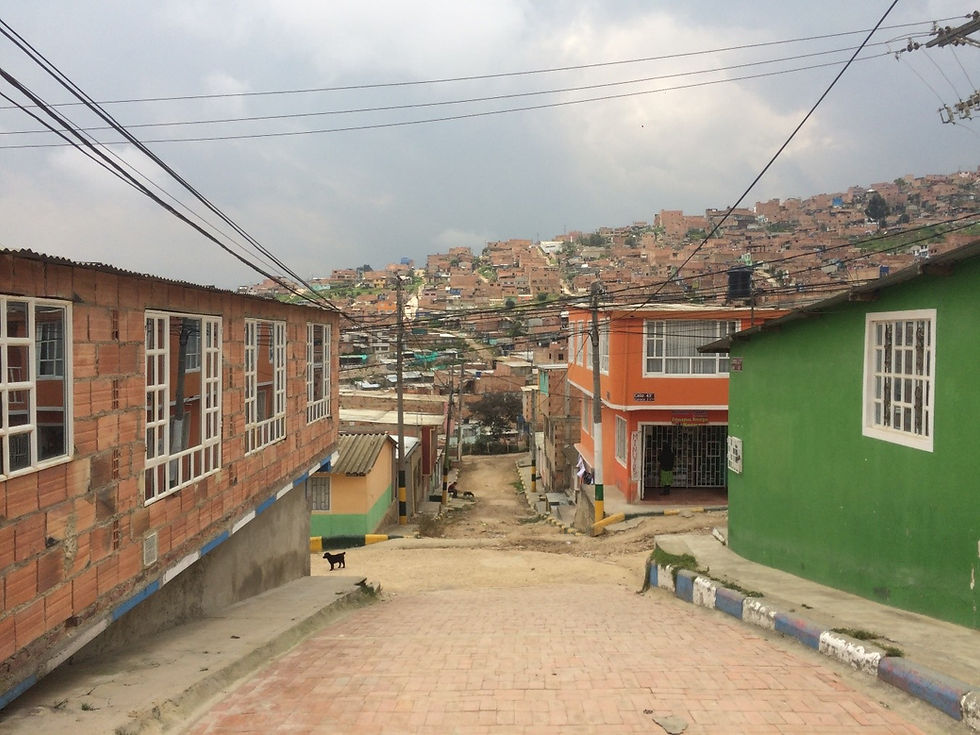By Mateo Villamizar Chaparro | September 8. 2017

Does property formalization increase economic development? This is one of the questions analyzed in a research by Francisco Garfias and Darin Christensen in Soacha, Colombia. For my internship, I worked as a research assistant for this project, and one of my multiple tasks was to conduct interviews and focus groups in Cazucá, one of the communes of Soacha. Doing field work in a place where you are a stranger is always hard, and it entails a series of challenges that sometimes might be overlooked by some practical guides and methodological classes.
The commune of Cazucá presents an amalgam of social phenomena that has attracted the attention of many national and international scholars. On one hand, it is located in the outskirts of Bogotá, the capital city of Colombia. In fact, only one road marks the geographical barrier between the city and the municipality. The differences between both sides of this road could be immense at times, though. On the other hand, the commune is now the home to one of the biggest migrating populations in the country. Two migration waves are worth mentioning. The first one was a response to high housing prices in Bogotá during the 1970’s that made owning a house inaccessible to some families. The second wave is due to the violent conflict that has been affecting the country for more than 50 years and has produced one of the largest numbers of internally displaced people in the world.
I had done field work before, but the experience in Cazucá was a whole different circumstance. For once, we needed to find people known in the community not only for making our access to them easier but also for security concerns. Cazucá has gained the attention of scholars and policy makers because, due to its geographical location, it is a part of a strategic road to the capital from the South of the country - a road that was widely used and contested by different armed groups. Moreover, the fact that most of the neighborhoods there are squatters helps the cohabitation of legal and illegal activities in the area. On various occasions, some of the people we talked to were joking that walking in Cazucá with a community leader was safer than riding Bogotá’s public transportation. Gladly, nothing ever happened to us but the preconception of insecurity was latent.
One of my main concerns while interviewing people and conducting focus groups was the trade-off between confidence and objectivity. Usually, in these activities you want to stay as objective as possible in order to understand all the social phenomena under study. Simultaneously, you also want people to trust you and open themselves to you - to break that wall between the researcher and the participants. Moreover, it helps to have a dialogue that is not mediated by preconceptions and certain cultural differences that generate the identities of “us” and “them”. Such differences can be related, for example, to the way you are dressed or to the use of idioms and specific jargon.
The thing about field work is that it works both ways. The more you meet with people on the study site of the project, the more these people learn about you. As a result, the once popular idea of passive study subjects disappears, giving rise to strategic respondents and making the concept of pure objectivity an illusion. My experience in Cazucá showed me that because of constant analysis from outsiders, some inhabitants and their leaders look for a personal - or in some cases communal - benefits to participate in the study. Furthermore, they can answer strategically to gain benefits from the projects being implemented. Taking this into consideration, the interactions between researchers and participants get completely transformed.
As a concluding remark, there is no unique formula for conducting field work. The context where it is done and the people with whom you speak can generate a set of infinite interactive scenarios that are impossible to account for in guides or methods classes. In my opinion, the best way to conduct methodologically rigorous field work is a mixture of reading and learning from the experiences of others while you learn, hone, and adapt your skills for the particular tasks you signed up for.

Mateo Villamizar Chaparro is a Colombian student doing the Master of International Affairs at GPS. Prior to that, Mateo pursued studies in Economics and Political Science. His research interests revolve around methodology, political institutions and human geography. He is the current Managing Director of JIPS.

Comments